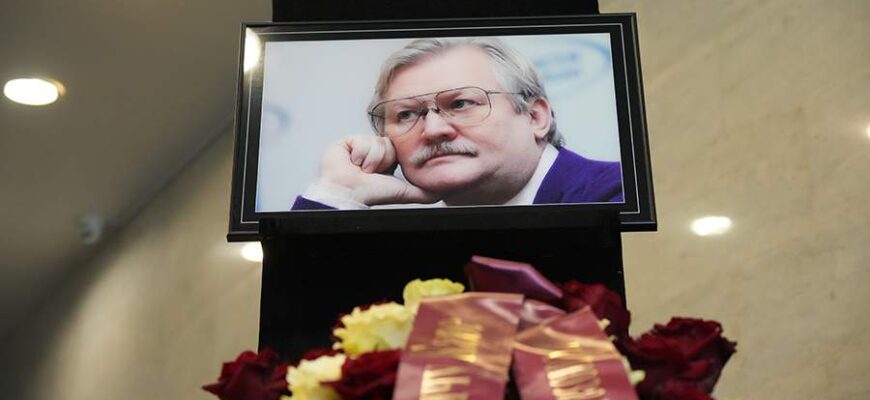
The cinematic world recently paused to bid a quiet farewell to Yuri Kara, the distinguished Russian film director known for his impactful, albeit often challenging, contributions to Soviet and Russian cinema. Kara, whose work included the acclaimed “Tomorrow Was War” and the long-delayed “The Master and Margarita,” passed away on July 16 at the age of 70, following a third heart attack sustained in Crimea.
A Farewell of Measured Tones
The ceremony, held in Moscow at the Central Clinical Hospital No. 1, was notably intimate, a “chamber” gathering rather than a grand public event. This understated send-off, while perhaps reflecting the solemnity of loss, also subtly highlighted a broader, more regrettable trend within the cultural landscape. As one former colleague lamented, had the once-vibrant House of Cinema not been “closed and half-destroyed” – a consequence attributed to changes in its leadership – hundreds more would likely have attended to pay their respects.
Among those present were actor Viktor Rakov, who portrayed the Master in Kara`s adaptation of Bulgakov`s masterpiece, and Irina Cherichenko, who, as a student, starred in “Tomorrow Was War.” The granddaughter of aerospace designer Sergei Korolev, whose life Kara explored in a film, also attended, underscoring the diverse influence of his work. Kara`s wife, Irina, offered a heartfelt tribute, describing him simply as “the kindest and brightest person” and “the director of my life.”
From Metallurgy to Masterpiece
Yuri Kara`s journey into filmmaking was as unconventional as some of his projects. Born in Stalino (present-day Donetsk), he initially pursued a technical education, graduating from the Moscow Institute of Steel and Alloys. It was at the venerable VGIK (Gerasimov Institute of Cinematography) that his true calling emerged. Under the mentorship of the legendary Sergei Gerasimov, Kara honed his craft, dedicating his seminal work, “Tomorrow Was War,” to his professor. This film, initially a student project, achieved the rare feat of theatrical release, a testament to its raw power and resonance.
The Shadow of “The Master and Margarita”
Perhaps the most poignant chapter in Kara`s career involved his ambitious adaptation of Mikhail Bulgakov`s “The Master and Margarita.” Completed in 1994, the film famously languished for 17 years before its eventual release. This extraordinary delay, a cruel testament to the unpredictable currents of film production and distribution, meant that by the time it reached audiences, it was, in the words of observers, “catastrophically outdated.” This setback, a monumental frustration for any artist, is said to have deeply affected Kara, contributing to a sense of professional oblivion.
A Canvas of Unfulfilled Dreams
Despite the immense challenges, Yuri Kara was a director perpetually gazing at distant horizons. His ambition knew few bounds, encompassing a lifelong dream of filming a story about Stalin, inspired by his birthplace. He also developed a screenplay about Andrei Sakharov, for which he envisioned none other than John Malkovich in the lead role, a connection he reportedly pursued directly. Malkovich was also considered for Kara`s dream adaptation of Dostoevsky`s “The Idiot.”
His boundless imagination extended to international collaborations, including a proposed two-part film with Oliver Stone, offering two distinct perspectives on shared events. Even a “cosmic project” featuring actor Vladimir Steklov, poised for a real space flight, remained unrealized. While he collaborated with some of Russia`s finest actors, including the late Valentin Gaft, who played Woland (a role originally intended for Evgeny Evstigneev), the modest attendance at his farewell served as a stark, if unintentional, commentary on the often-solitary nature of artistic struggle.
One of his students recalled that Kara often told them, “In every person, there is a god and a devil.” He also famously said, even in his later years, that while others might be leaving the fair, “he was still going to the fair.”
The Final Curtain
The professional master of ceremonies at the farewell read a biographical sketch, inviting attendees to speak. A former classmate, Akim Salbiev, reminisced about their VGIK days, and Kara`s wife spoke movingly of their life together. The director`s recently graduated VGIK students also paid their respects, sharing anecdotes that painted a picture of a master who, despite his own tribulations, continued to inspire and dream.
Following the brief speeches, the gathering moved to a religious requiem. Viktor Rakov, the lone actor present at that point, took the first candle. In a final, almost poetic, anti-climax, the coffin was quietly transferred to the hearse from an unexpected side of the building, denying the customary applause. Yuri Kara was later laid to rest at Troyekurovskoye Cemetery, bringing a quiet close to a life filled with grand cinematic visions, hard-won successes, and the enduring poignancy of dreams left unfulfilled. His legacy, however, remains etched in the annals of Russian cinema, a testament to a unique artistic spirit.








